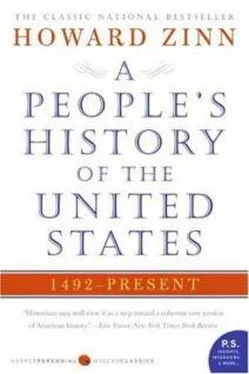Howard Zinn - A People
Здесь есть возможность читать онлайн «Howard Zinn - A People» весь текст электронной книги совершенно бесплатно (целиком полную версию без сокращений). В некоторых случаях можно слушать аудио, скачать через торрент в формате fb2 и присутствует краткое содержание. Издательство: Harper-Collins, Жанр: Фэнтези, на английском языке. Описание произведения, (предисловие) а так же отзывы посетителей доступны на портале библиотеки ЛибКат.
- Название:A People
- Автор:
- Издательство:Harper-Collins
- Жанр:
- Год:неизвестен
- ISBN:нет данных
- Рейтинг книги:4 / 5. Голосов: 1
-
Избранное:Добавить в избранное
- Отзывы:
-
Ваша оценка:
- 80
- 1
- 2
- 3
- 4
- 5
A People: краткое содержание, описание и аннотация
Предлагаем к чтению аннотацию, описание, краткое содержание или предисловие (зависит от того, что написал сам автор книги «A People»). Если вы не нашли необходимую информацию о книге — напишите в комментариях, мы постараемся отыскать её.
A People — читать онлайн бесплатно полную книгу (весь текст) целиком
Ниже представлен текст книги, разбитый по страницам. Система сохранения места последней прочитанной страницы, позволяет с удобством читать онлайн бесплатно книгу «A People», без необходимости каждый раз заново искать на чём Вы остановились. Поставьте закладку, и сможете в любой момент перейти на страницу, на которой закончили чтение.
Интервал:
Закладка:
When the British Parliament turned to its next attempt to tax the colonies, this time by a set of taxes which it hoped would not excite as much opposition, the colonial leaders organized boycotts. But, they stressed, "No Mobs or Tumults, let the Persons and Properties of your most inveterate Enemies be safe." Samuel Adams advised: "No Mobs- No Confusions-No Tumult." And James Otis said that "no possible circumstances, though ever so oppressive, could be supposed sufficient to justify private tumults and disorders…"
Impressment and the quartering of troops by the British were directly hurtful to the sailors and other working people. After 1768, two thousand soldiers were quartered in Boston, and friction grew between the crowds and the soldiers. The soldiers began to take the jobs of working people when jobs were scarce. Mechanics and shopkeepers lost work or business because of the colonists' boycott of British goods. In 1769, Boston set up a committee "to Consider of some Suitable Methods of employing the Poor of the Town, whose Numbers and distresses are dayly increasing by the loss of its Trade and Commerce."
On March 5, 1770, grievances of ropemakers against British soldiers taking their jobs led to a fight. A crowd gathered in front of the customhouse and began provoking the soldiers, who fired and killed first Crispus Attucks, a mulatto worker, then others. This became known as the Boston Massacre. Feelings against the British mounted quickly. There was anger at the acquittal of six of the British soldiers (two were punished by having their thumbs branded and were discharged from the army). The crowd at the Massacre was described by John Adams, defense attorney for the British soldiers, as "a motley rabble of saucy boys, negroes, and mulattoes, Irish teagues and outlandish jack tarrs." Perhaps ten thousand people marched in the funeral procession for the victims of the Massacre, out of a total Boston population of sixteen thousand. This led England to remove the troops from Boston and try to quiet the situation.
Impressment was the background of the Massacre. There had been impressment riots through the 1760s in New York and in Newport, Rhode Island, where five hundred seamen, boys, and Negroes rioted after five weeks of impressment by the British. Six weeks before the Boston Massacre, there was a battle in New York of seamen against British soldiers taking their jobs, and one seaman was killed.
In the Boston Tea Party of December 1773, the Boston Committee of Correspondence, formed a year before to organize anti-British actions, "controlled crowd action against the tea from the start," Dirk Hoerder says. The Tea Party led to the Coercive Acts by Parliament, virtually establishing martial law in Massachusetts, dissolving the colonial government, closing the port in Boston, and sending in troops. Still, town meetings and mass meetings rose in opposition. The seizure of a powder store by the British led four thousand men from all around Boston to assemble in Cambridge, where some of the wealthy officials had their sumptuous homes. The crowd forced the officials to resign. The Committees of Correspondence of Boston and other towns welcomed this gathering, but warned against destroying private property.
Pauline Maier, who studied the development of opposition to Britain in the decade before 1776 in her book From Resistance to Revolution , emphasizes the moderation of the leadership and, despite their desire for resistance, their "emphasis on order and restraint." She notes: "The officers and committee members of the Sons of Liberty were drawn almost entirely from the middle and upper classes of colonial society." In Newport, Rhode Island, for instance, the Sons of Liberty, according to a contemporary writer, "contained some Gentlemen of the First Figure in 'Town for Opulence, Sense and Politeness." In North Carolina "one of the wealthiest of the gentlemen and freeholders" led the Sons of Liberty. Similarly in Virginia and South Carolina. And " New York 's leaders, too, were involved in small but respectable independent business ventures." Their aim, however, was to broaden their organization, to develop a mass base of wage earners.
Many of the Sons of Liberty groups declared, as in Milford, Connecticut, their "greatest abhorrence" of lawlessness, or as in Annapolis, opposed "all riots or unlawful assemblies tending to the disturbance of the public tranquility." John Adams expressed the same fears: "These tarrings and featherings, this breaking open Houses by rude and insolent Rabbles, in Resentment for private Wrongs or in pursuing of private Prejudices and Passions, must be discountenanced.
In Virginia, it seemed clear to the educated gentry that something needed to be done to persuade the lower orders to join the revolutionary cause, to deflect their anger against England. One Virginian wrote in his diary in the spring of 1774: "The lower Class of People here are in tumult on account of Reports from Boston, many of them expect to he press'd amp; compell'd to go and fight the Britains!" Around the time of the Stamp Act, a Virginia orator addressed the poor: "Are not the gentlemen made of the same materials as the lowest and poorest among you?… Listen to no doctrines which may tend to divide us, but let us go hand in hand, as brothers…"
It was a problem for which the rhetorical talents of Patrick Henry were superbly fitted. He was, as Rhys Isaac puts it, "firmly attached to the world of the gentry," but he spoke in words that the poorer whites of Virginia could understand. Henry's fellow Virginian Edmund Randolph recalled his style as "simplicity and even carelessness.… His pauses, which for their length might sometimes be feared to dispell the attention, rivited it the more by raising the expectation."
Patrick Henry's oratory in Virginia pointed a way to relieve class tension between upper and lower classes and form a bond against the British. This was to find language inspiring to all classes, specific enough in its listing of grievances to charge people with anger against the British, vague enough to avoid class conflict among the rebels, and stirring enough to build patriotic feeling for the resistance movement.
Tom Paine's Common Sense , which appeared in early 1776 and became the most popular pamphlet in the American colonies, did this. It made the first bold argument for independence, in words that any fairly literate person could understand: "Society in every state is a blessing, but Government even in its best state is but a necessary evil…"
Paine disposed of the idea of the divine right of kings by a pungent history of the British monarchy, going back to the Norman conquest of 1066, when William the Conqueror came over from France to set himself on the British throne: "A French bastard landing with an armed Bandits and establishing himself king of England against the consent of the natives, is in plain terms a very paltry rascally original. It certainly hath no divinity in it."
Paine dealt with the practical advantages of sticking to England or being separated; he knew the importance of economics:
I challenge the wannest advocate for reconciliation to show a single advantage that this continent can reap by being connected with Great Britain. I repeat the challenge; not a single advantage is derived. Our corn will fetch its price in any market in Europe, and our imported goods must be paid for by them where we will…
As for the bad effects of the connection with England, Paine appealed to the colonists' memory of all the wars in which England had involved them, wars costly in lives and money:
But the injuries and disadvantages which we sustain by that connection are without number… any submission to, or dependence on, Great Britain, tends directly to involve this Continent in European wars and quarrels, and set us at variance with nations who would otherwise seek our friendship.…
Читать дальшеИнтервал:
Закладка:
Похожие книги на «A People»
Представляем Вашему вниманию похожие книги на «A People» списком для выбора. Мы отобрали схожую по названию и смыслу литературу в надежде предоставить читателям больше вариантов отыскать новые, интересные, ещё непрочитанные произведения.
Обсуждение, отзывы о книге «A People» и просто собственные мнения читателей. Оставьте ваши комментарии, напишите, что Вы думаете о произведении, его смысле или главных героях. Укажите что конкретно понравилось, а что нет, и почему Вы так считаете.












